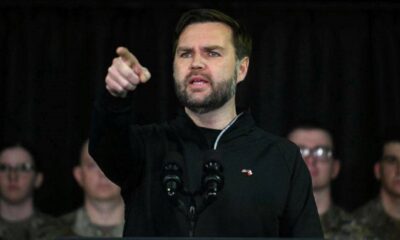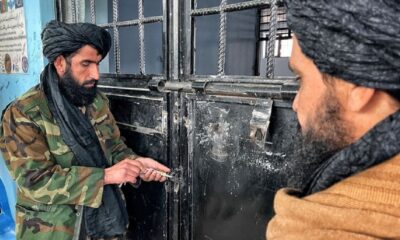World
UN demands ceasefire in Gaza as Israel and US show increasing divisions
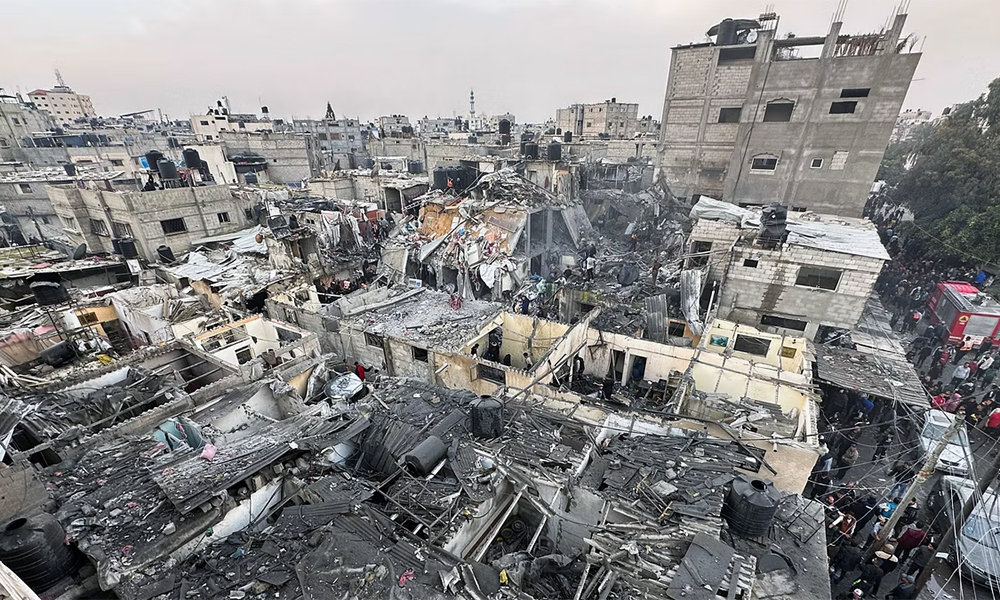
Israel faced growing diplomatic isolation in its war against Hamas as the United Nations demanded an immediate humanitarian ceasefire in Gaza and U.S. President Joe Biden told the longtime ally its “indiscriminate” bombing of civilians was hurting international support.
After dire warnings from U.N. officials about a deepening humanitarian crisis in Gaza, the 193-member U.N. General Assembly on Tuesday passed a resolution calling for a ceasefire with three-quarters of member states voting in favour, Reuters reported.
“The price of defeating Hamas cannot be the continuous suffering of all Palestinian civilians,” the leaders of Canada, Australia and New Zealand said separately in a joint statement calling for a ceasefire.
The Palestinian Authority welcomed the resolution and urged countries to pressure Israel to comply.
The U.S. and Israel, which argue a ceasefire only benefits Hamas, voted against the measure along with eight other countries.
Before the resolution, Biden said Israel now has support from “most of the world” including the U.S. and European Union for its fight against the Palestinian militant group Hamas.
“But they’re starting to lose that support by indiscriminate bombing that takes place,” he told a campaign donor event in Washington.
In the most public sign of division between the leaders so far, Biden also said that Israeli Prime Minister Benjamin Netanyahu needed to change his hardline government and that ultimately Israel “can’t say no” to an independent Palestinian state – something that Israeli hardliners oppose.
Israel’s assault on Gaza to root out Hamas has killed at least 18,205 Palestinians including many children and wounded nearly 50,000 since Oct. 7, according to the Gaza health ministry.
The conflict has also led to starvation, displaced 85% of the population from their homes and caused diseases to spread, according to the U.N. and Gaza health ministry.
The Wall Street Journal and ABC meanwhile reported that the Israeli military began pumping seawater into Hamas’ tunnel network, where the militant group is believed to be hiding fighters and munitions and basing hit-and-run street attacks on Israeli troops.
Biden said he had heard unconfirmed reports there were no hostages in the tunnels. Some hostages freed during a ceasefire reported they had been held in tunnels. The Israeli military said it was looking into the reports.
World
Myanmar quake death toll nears 700 as international aid starts to arrive

International aid began to arrive in Myanmar on Saturday as rescuers searched for survivors after a powerful earthquake devastated the Southeast Asian nation amid concerns the number killed would soar.
The death toll in Myanmar jumped to 694 with 1,670 injured, the military government said, up sharply from the 144 dead that state media reported on Friday, according to Reuters.
“Infrastructure such as roads, bridges, and buildings were affected, leading to casualties and injuries among civilians. Search and rescue operations are currently being carried out in the affected areas,” the junta said in a statement issued on state media.
The junta leader, General Min Aung Hlaing, had warned on Friday of more deaths and injuries as he invited “any country” to provide help and donations.
A Chinese rescue team arrived on Saturday while Russia and the U.S. offered aid in the disaster, which struck at lunchtime on Friday and damaged hundreds of buildings in neighbouring Thailand.
The United States Geological Service’s predictive modelling estimated the death toll could exceed 10,000 people in Myanmar, and that losses could be greater than the value of the country’s gross domestic product. Susan Hough, a scientist in the USGS’s Earthquake Hazards Program, told Reuters it was difficult to predict an earthquake’s death toll, for various reasons including timing. When an earthquake strikes during the daytime, as it did in Myanmar, “people are awake, they have their wits about them, they are better able to respond,” she said.
SEARCHING FOR WORKERS IN TOWER RUBBLE
Much of the devastation was in Myanmar’s second-largest city, Mandalay, close to the epicentre of the quake.
In the Thai capital Bangkok, 1,000 km (620 miles) from the epicentre a rescue mission was stepped up on Saturday to find construction workers trapped under the rubble of a collapsed 33-storey tower.
A 37-strong team from China landed in Yangon, Myanmar’s former capital, early on Saturday, carrying medicine and equipment to detect signs of life with them, the Chinese embassy said in a Facebook post.
Russia said it was sending 120 experienced rescuers as well as doctors and search dogs, state news agency TASS reported.
U.S. President Donald Trump said on Friday he had spoken with officials in Myanmar and that his administration would be providing some form of assistance.
Hough, who worked in Myanmar on the local seismology network, said the country’s mix of modern structures and traditional buildings would also play a role. Traditional buildings “are going to be less potentially deadly than concrete,” she said.
Thai authorities said nine people had died and 101 were missing in Bangkok, mostly labourers trapped in the rubble of the collapsed tower.
“We will do everything, we will not give up on saving lives, we will use all resources,” Bangkok Governor Chadchart Sittipunt said at the site on Saturday, as excavators moved debris and drones scoured the rubble searching for survivors.
The Thai capital ground to a halt on Friday and Chadchart said hundreds of people had spent the night in city parks, but he said the situation was improving.
World
Putin suggests temporary administration for Ukraine to end war
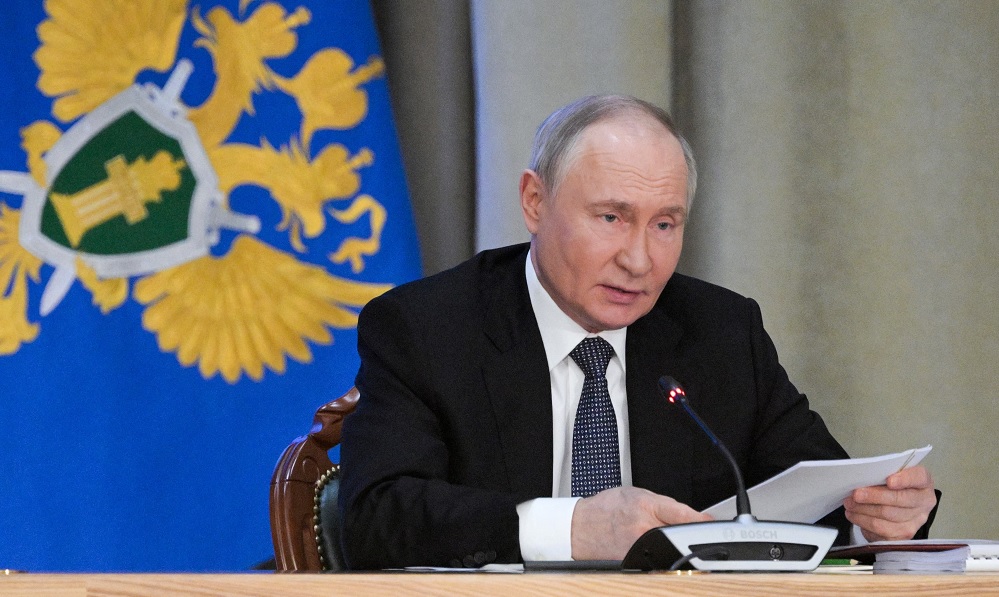
Russian President Vladimir Putin suggested Ukraine be placed under a form of temporary administration to allow for new elections and the signature of key accords to reach a settlement in the war, Russian news agencies reported early on Friday.
Putin’s comments, during a visit to the northern port of Murmansk, come amid U.S. attempts to forge a settlement to the conflict by re-establishing links with Russia and engaging with both Moscow and Kyiv, in separate talks. The Kremlin leader said he believed U.S. President Donald Trump truly wanted peace, Reuters reported.
Russia’s invasion of Ukraine in February 2022 has left hundreds of thousands of dead and injured, displaced millions of people, reduced towns to rubble and triggered the sharpest confrontation for decades between Moscow and the West.
Putin’s suggestion of a temporary administration appeared to address his long-held complaint that Ukraine’s authorities are not a legitimate negotiating partner as President Volodymyr Zelenskiy has stayed in power beyond the May 2024 end of his mandate.
“In principle, of course, a temporary administration could be introduced in Ukraine under the auspices of the U.N, the United States, European countries and our partners,” Putin was quoted as saying in talks with seamen at the port.
“This would be in order to hold democratic elections and bring to power a capable government enjoying the trust of the people and then to start talks with them about a peace treaty.”
He said Trump’s efforts to proceed with direct talks with Russia – in contrast with his predecessor Joe Biden, who shunned contacts – showed the new president wanted peace.
“In my opinion, the newly elected president of the United States sincerely wants an end to the conflict for a number of reasons,” the agencies quoted him as saying.
A White House National Security Council spokesperson, asked about Putin’s remarks on temporary administration, said governance in Ukraine was determined by its constitution and the people of the country.
There was no immediate comment from Ukraine.
European leaders have pressed on with their own efforts, pledging after a meeting in Paris on Thursday to strengthen Kyiv’s army to ensure it was the cornerstone of future security in Ukraine.
France and Britain tried to expand support for a foreign “reassurance force” in the event of a truce with Russia, although Moscow rejects any presence of foreign troops in Ukraine.
UKRAINE REJECTS NOTION OF ILLEGITIMACY
Zelenskiy has rejected any notion questioning his legitimacy, saying Ukraine is barred by law from holding elections under martial law and holding a poll in wartime conditions would in any case prove impossible.
Zelenskiy has repeatedly accused Putin in recent days of wanting to press on with the conflict.
The Trump administration has proposed a new, more expansive minerals deal with Ukraine, according to three people familiar with the ongoing negotiations and a summary of a draft proposal obtained by Reuters.
Trump has said a minerals deal will help secure a peace agreement by giving the United States a financial stake in Ukraine’s future.
In his comments, Putin said Russia was steadily moving forward to achieving the goals it had set out in its Ukraine operation.
Russia, Putin said, was in favour of “peaceful solutions to any conflict, including this one, through peaceful means, but not at our expense”.
“Throughout the entire line of military contact, our troops are holding the strategic initiative,” he said.
“We are gradually – perhaps not as quickly as some might like – but still persistently and with confidence moving towards achieving the goals set out at the beginning of this operation,” the agencies quoted him as saying.
More than three years after launching their full-scale invasion of Ukraine, Russian forces now hold about 20% of the country, with Moscow declaring four regions annexed. Its forces have also recovered much of the territory it initially lost in a Ukrainian incursion last August into its western Kursk region.
Putin praised the efforts in seeking a solution from the BRICS grouping it promotes as an alternative to traditional alliances – singling out China and India for praise.
He said Russia was ready to cooperate with many countries, including North Korea, to help end the war.
Western and Ukrainian sources say more than 11,000 North Korean troops have been sent to bolster Russian forces in the Kursk region, although Moscow has not confirmed this.
Putin said Russia was also ready to work with Europe, but adding that Europe “conducts itself in inconsistent fashion”.
European countries, he said, were trying “lead us around by the nose, but it’s okay, we’ve become used to it. I hope that we won’t make any mistakes based on excessive trust in our so-called partners.”
World
Secretive Chinese network tries to lure fired US federal workers, research shows
Researcher identifies “network of fake consulting and headhunting firms”

A network of companies operated by a secretive Chinese tech firm has been trying to recruit recently laid-off U.S. government workers, according to job ads and a researcher who uncovered the campaign, Reuters reported Wednesday.
Max Lesser, a senior analyst on emerging threats with the Washington-based think tank Foundation for Defense of Democracies, said some companies placing recruitment ads were “part of a broader network of fake consulting and headhunting firms targeting former government employees and AI researchers.”
Little information is publicly available on the four consultancies and recruitment companies allegedly involved in the network, which in some cases shared overlapping websites, were hosted on the same server, or had other digital links, according to Reuters’ reporting and Lesser’s research.
The four companies’ websites are hosted at the same IP address alongside Smiao Intelligence, an internet services company whose website became unavailable during Reuters’ reporting.
Reuters could not determine the nature of the relationship between Smiao Intelligence and the four companies.
The news agency’s attempts to track down the four companies and Smiao Intelligence ran into numerous dead-ends including unanswered phone calls, phone numbers that no longer work, fake addresses, addresses that lead to empty fields, unanswered emails and deleted job listings from LinkedIn.
Lesser, who uncovered the network and shared his research with Reuters ahead of publication, said the campaign follows “well-established” techniques used by previous Chinese intelligence operations.
“What makes this activity significant,” he said, “is that the network seeks to exploit the financial vulnerabilities of former federal workers affected by recent mass layoffs.”
Reuters could not determine if the companies are linked to the Chinese government or whether any former federal workers were recruited.
Asked about the research, three intelligence analysts told Reuters the network appeared to be a prime example of how foreign-linked entities are trying to gather intelligence from staff fired or forced into retirement by President Donald Trump and billionaire tech tycoon Elon Musk’s Department of Government Efficiency.
A spokesperson for the Chinese Embassy in Washington told Reuters in an email that China was unaware of any of the entities allegedly involved in the campaign and Beijing respects data privacy and security.
A White House spokesperson said China was constantly trying to exploit the United States’ “free and open system” through espionage and coercion.
“Both active and former government employees must recognize the danger these governments pose and the importance of safeguarding government information,” the spokesperson said.
One of the companies in the network, RiverMerge Strategies, bills itself on its website as a “professional geopolitical risk consulting company” and posted two since-deleted job listings on its since-removed LinkedIn page in mid-February.
One ad that sought a “Geopolitical Consulting Advisor” with experience with government agencies, international organizations, or multinational corporations, displayed that it had more than 200 applications, according to a screenshot of the LinkedIn post.
The other sought a human resources specialist who could “utilize a deep understanding of the Washington talent pool to identify candidates with policy or consulting experience,” and “leverage connections to local professional networks, think tanks, and academic institutions.”
-
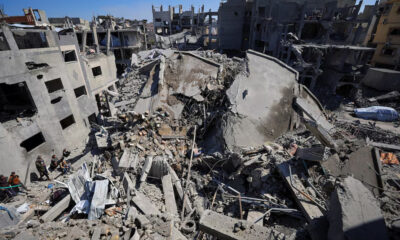
 Regional5 days ago
Regional5 days agoEgypt makes new proposal to restore Gaza truce as Israeli strikes kill 65
-

 International Sports5 days ago
International Sports5 days agoIPL 2025: Last over drama; Ashutosh Sharma clinches win for Delhi Capitals
-

 Sport4 days ago
Sport4 days agoAfghanistan eliminated from Asian Beach Soccer Championship
-
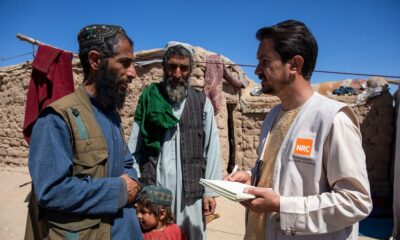
 Latest News5 days ago
Latest News5 days agoNorwegian Refugee Council cuts back on essential humanitarian services in Afghanistan
-
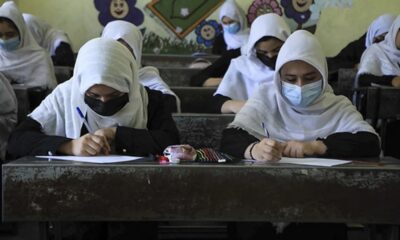
 Latest News5 days ago
Latest News5 days agoUN warns over 4 million Afghan girls will be deprived of education by 2030 if ban continues
-

 World4 days ago
World4 days agoSecretive Chinese network tries to lure fired US federal workers, research shows
-
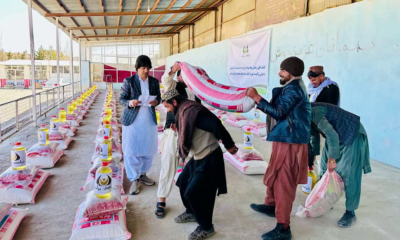
 Latest News4 days ago
Latest News4 days agoDozens of needy families in Ghazni get much needed food aid from Bayat Foundation
-

 Sport4 days ago
Sport4 days agoAFC Asian Cup 2027 Qualifiers: Myanmar defeat Afghanistan 2-1






